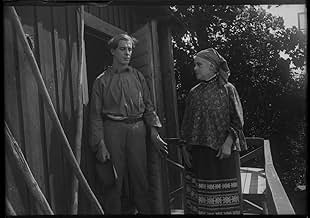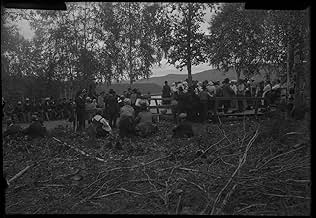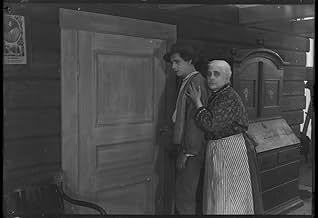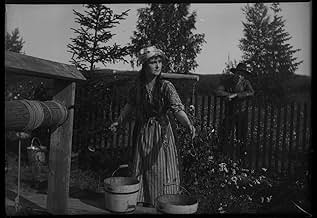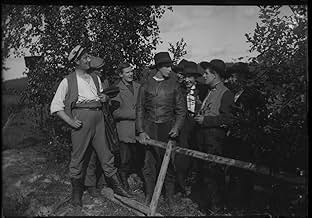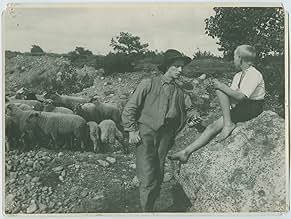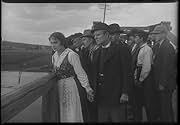Adicionar um enredo no seu idiomaOlof Koskela is the son of a rich farmer. He seduces young girls at random, until an inconsistent gesture rushes him away from home and his carefree lifestyle. Based on the 1905 novel by Fin... Ler tudoOlof Koskela is the son of a rich farmer. He seduces young girls at random, until an inconsistent gesture rushes him away from home and his carefree lifestyle. Based on the 1905 novel by Finnish author Johannes Linnankoski.Olof Koskela is the son of a rich farmer. He seduces young girls at random, until an inconsistent gesture rushes him away from home and his carefree lifestyle. Based on the 1905 novel by Finnish author Johannes Linnankoski.
- Direção
- Roteiristas
- Artistas
Ernst Brunman
- En man på kaféet i staden (1)
- (não creditado)
Arvid Dahlberg
- Flottare (1)
- (não creditado)
Bengt Djurberg
- En ung man
- (não creditado)
Emil Fjellström
- En man på kaféet i staden (2)
- (não creditado)
Mona Geijer-Falkner
- Piga på Koskelagården
- (não creditado)
Paul Hagman
- Flottare (2)
- (não creditado)
Doris Nelson
- Prostituerad
- (não creditado)
Tekla Sjöblom
- Äldre piga på Koskelagården
- (não creditado)
Olof Ås
- Flottare (3)
- (não creditado)
Avaliações em destaque
I finally got to see this after watching a clip of it in the wonderful BBC documentary 'Cinema Europe' many, many years ago.
I will admit straight up that I am a Lars Hanson fan, but, not a blinkered one, he was horribly miscast in 'The Informer' for example. However, I enjoyed this movie immensely, another fine piece of directing by Mauritz Stiller, what a loss to Hollywood, he gave them Garbo they gave him nothing in return. Beautifully shot and acted by all, it has the right atmosphere and feels like it was made when it was set. Ignore the daft observation by another reviewer about the family farmhouse, silly and pointless.
I didn't feel like I was watching a movie made over 100 years ago, imaginative at times, sad at times, but, with a hapy ending.
I don't care for reviews with innuendos about an actor's sexuality, yes, Stiller was gay, that is common knowledge, but what was his point about implying that Lars Hanson was too? What relevance is that to the movie? Oh well, it's easy to try and out the dead actors.
I will admit straight up that I am a Lars Hanson fan, but, not a blinkered one, he was horribly miscast in 'The Informer' for example. However, I enjoyed this movie immensely, another fine piece of directing by Mauritz Stiller, what a loss to Hollywood, he gave them Garbo they gave him nothing in return. Beautifully shot and acted by all, it has the right atmosphere and feels like it was made when it was set. Ignore the daft observation by another reviewer about the family farmhouse, silly and pointless.
I didn't feel like I was watching a movie made over 100 years ago, imaginative at times, sad at times, but, with a hapy ending.
I don't care for reviews with innuendos about an actor's sexuality, yes, Stiller was gay, that is common knowledge, but what was his point about implying that Lars Hanson was too? What relevance is that to the movie? Oh well, it's easy to try and out the dead actors.
"Sangen Om Den Eldröda Blomman" ( "Song Of The Scarlet Flower" ) was a recent and remarkable silent surprise for this Herr Von; the oeuvre is an excellent Herr Stiller silent film that this German count watched in a newly restored and tinted copy. It combines the well-known aesthetics, technical improvements and artistic merits for which the Nordic director was known and praised since those early silent times till today.
The film tells of the merry and carefree love life of young Olof ( Herr Lars Hanson ) a woodsman who during his search for true love, seduces many fauleins ( just like this German aristocrat well, not exactly because the purpose of this Herr Von's seduction of rich fräulein heiresses are their great fortunes ). He will suffer disappointment and deception, all those problems that turn up in any loving relationship. Finally he will find responsibility and maturity, learning during his particular quest that his actions always have consequences in different degrees to the people around him. This Herr Von can describe "Sangen Om " as a kind of coming of age film, the special introspective growth toward maturity of a free and easy youngster.
As this German count said before, the film displays Stiller's characteristic artistic virtues. ; in the first part of the film, we can see elements of comedy, not exactly like the comedy of intrigues in other Stiller films, but humor of a more cheerful sort, highlighting the self-involvement of our hero. Olof 's frivolous flirtations with the different girls eventually turn romantic and then turn into drama. There is conflict in the troubled relationship between Olof and his father and later with the father of his beloved. The beautiful and wild natural landscapes of Norrland and northern Sweden lend the tale a certain power and is characteristic of Herr Stiller's other silents where Nature emerges as an important character in the story. This is strongly reflected throughout the film but especially during the frantic scene wherein Olof descends into the troubled waters of a river, a beautiful metaphor for the hardships that our hero has to endure until he finds himself.
"Sangen Om Den Eldröda Blomman" is an excellent, beautiful film, a solid, technically perfect and intricate production of 1919 that demonstrates once again the importance of Herr Stiller for silent film history.
And now, if you'll allow me, I must temporarily take my leave because this German Count must return to Teutonic nature.
Herr Graf Ferdinand Von Galitzien http://ferdinandvongalitzien.blogspot.com/
The film tells of the merry and carefree love life of young Olof ( Herr Lars Hanson ) a woodsman who during his search for true love, seduces many fauleins ( just like this German aristocrat well, not exactly because the purpose of this Herr Von's seduction of rich fräulein heiresses are their great fortunes ). He will suffer disappointment and deception, all those problems that turn up in any loving relationship. Finally he will find responsibility and maturity, learning during his particular quest that his actions always have consequences in different degrees to the people around him. This Herr Von can describe "Sangen Om " as a kind of coming of age film, the special introspective growth toward maturity of a free and easy youngster.
As this German count said before, the film displays Stiller's characteristic artistic virtues. ; in the first part of the film, we can see elements of comedy, not exactly like the comedy of intrigues in other Stiller films, but humor of a more cheerful sort, highlighting the self-involvement of our hero. Olof 's frivolous flirtations with the different girls eventually turn romantic and then turn into drama. There is conflict in the troubled relationship between Olof and his father and later with the father of his beloved. The beautiful and wild natural landscapes of Norrland and northern Sweden lend the tale a certain power and is characteristic of Herr Stiller's other silents where Nature emerges as an important character in the story. This is strongly reflected throughout the film but especially during the frantic scene wherein Olof descends into the troubled waters of a river, a beautiful metaphor for the hardships that our hero has to endure until he finds himself.
"Sangen Om Den Eldröda Blomman" is an excellent, beautiful film, a solid, technically perfect and intricate production of 1919 that demonstrates once again the importance of Herr Stiller for silent film history.
And now, if you'll allow me, I must temporarily take my leave because this German Count must return to Teutonic nature.
Herr Graf Ferdinand Von Galitzien http://ferdinandvongalitzien.blogspot.com/
I'm unfamiliar with the novel this Swedish silent production, "The Song of the Red Flower" or, for added alliteration, "Song of the Scarlet Flower," was based on, but reportedly it was Finnish author and playwright Johannes Linnankoski's most famous work, although apparently it's essentially just a Scandinavian Don Juan, a libertine who romances one woman after another, and if the purple prose in some of the title cards here is any indication, I'm none too interested in seeking it out. This Don Juan, too, as played by a young Lars Hanson, allegedly comes from a wealthy, farm-owning family (although the view we get inside their shack pales in comparison to a decent studio apartment two centuries later). He abandons his parents over his womanizing ways, though, and becomes a logger and general tramp. In contrived melodramatic and vaguely moralistic fashion, he'll inevitably learn the errors of his ways.
Dull stuff, but this is the golden age of Swedish silent cinema here, and that includes one of the two best directors from the period, Mauritz Stiller, being behind the camera, along with cinematographers Henrik Jaenzon and Ragnar Westfelt, and gorgeous Swedish scenery in front of it. Freshly restored by the Svenska Filminstitutet and tinted/toned, boring and implicitly classist morality tale or not, it always looks lovely. Appropriately, it sets its Don Juan tale in the countryside for the most part, with him only moving to the city for the chapter where he learns his lesson--y'know, city bad, country good, as usual in these things. Even in the city, where it always seems to be night, as opposed to the rural sunlight, the cinematography and production looks good, including some rain effects and low-key lighting. There's a terrific mirror scene, where Hanson gets into a heated exchange with his reflected doppelgänger.
It's in the idyllic farmland and rapids-adjacent logging areas where the picture is at its picturesque peak, though. It's no coincidence that the best of these Swedish silents tend to feature nature as a character for the human characters to confront in some spectacular fashion (Stiller's "Sir Arne's Treasure" (1919) or "Johan" (1921), e.g., or Victor Sjöström's "Terje Vigen" (1917) or "The Outlaw and His Wife" (1918)). Even the sex of this Don Juan narrative is mostly found in nature metaphors as opposed to explicit infidelities. Quite a lot of it is just based on looks--cutting between characters looking at each other, as the spectator admires the backgrounds. Otherwise, it becomes pretty obvious that they're not talking about literal flowers here, as in the plants. Ultimately, Hanson's protagonist falls in love with a flower-girl who refuses to hand out her roses to just any tramp.... Yeah, they're not talking about roses. And, to prove himself to her, in perhaps the most spectacular sequence of the film (aside from the brief apparent use of a stunt dummy and the fact that it can't quite compete with my unfairly having just watched "Our Hospitality" (1923), with its amazing climax, prior), he rides a phallic log down the wet waves of a river's rapids. In the city here, they just have booze and prostitutes, but these country folk seem to have been into some elaborate courtship rituals.
Dull stuff, but this is the golden age of Swedish silent cinema here, and that includes one of the two best directors from the period, Mauritz Stiller, being behind the camera, along with cinematographers Henrik Jaenzon and Ragnar Westfelt, and gorgeous Swedish scenery in front of it. Freshly restored by the Svenska Filminstitutet and tinted/toned, boring and implicitly classist morality tale or not, it always looks lovely. Appropriately, it sets its Don Juan tale in the countryside for the most part, with him only moving to the city for the chapter where he learns his lesson--y'know, city bad, country good, as usual in these things. Even in the city, where it always seems to be night, as opposed to the rural sunlight, the cinematography and production looks good, including some rain effects and low-key lighting. There's a terrific mirror scene, where Hanson gets into a heated exchange with his reflected doppelgänger.
It's in the idyllic farmland and rapids-adjacent logging areas where the picture is at its picturesque peak, though. It's no coincidence that the best of these Swedish silents tend to feature nature as a character for the human characters to confront in some spectacular fashion (Stiller's "Sir Arne's Treasure" (1919) or "Johan" (1921), e.g., or Victor Sjöström's "Terje Vigen" (1917) or "The Outlaw and His Wife" (1918)). Even the sex of this Don Juan narrative is mostly found in nature metaphors as opposed to explicit infidelities. Quite a lot of it is just based on looks--cutting between characters looking at each other, as the spectator admires the backgrounds. Otherwise, it becomes pretty obvious that they're not talking about literal flowers here, as in the plants. Ultimately, Hanson's protagonist falls in love with a flower-girl who refuses to hand out her roses to just any tramp.... Yeah, they're not talking about roses. And, to prove himself to her, in perhaps the most spectacular sequence of the film (aside from the brief apparent use of a stunt dummy and the fact that it can't quite compete with my unfairly having just watched "Our Hospitality" (1923), with its amazing climax, prior), he rides a phallic log down the wet waves of a river's rapids. In the city here, they just have booze and prostitutes, but these country folk seem to have been into some elaborate courtship rituals.
This is not amongst my favourite Stiller films. The whimsical style of the curious 1905 Finnish (verse?) novel on which it is based, Laulu tulipunaisesta kukasta is more than a shade irritating although, it is true, that it makes a pleasant change in some ways from the rather over-substantial diet of Selma Lagerlof that formed the basis for so many Swedish films of the period. Nor do I find Lars Hanson at his best in these more manly role in which he was sometimes cast and for which he does not really have the "carrure". As with Cocteau and Jean Marais (who was however a more genuine cascadeur), one suspects Stiller was himself more than a little starry-eyed about his young star at this point in their respective careers.
The narration in demi-detached chapters is too patchy to provide good continuity. In the distinctly dark sixth chapter, there is a fine scene where Olaf talks to himself in a mirror as though to his "double" (evidently influenced by the German classic Der Student von Prag) but, excellent though the scene is, one is not very clear on how one has arrived at that point. And the morality of the final chapter is, to say the least, odd.
The compensation is the superb (as ever) cinematography of Henrik Jaenzon and the evocation of life amongst the river log-drivers. Had there been rather more of this and rather less of Hanson's romancing, it could have been a very good film....
I shall leave this world where men are men with a touch of the equally whimsical style of Herr von Galtizen which we all know in love, in words graven on the hearts of every true Marxist*, that I shall now myself return to the closet where men are empty overcoats.
*tendance Groucho, need I say.
The narration in demi-detached chapters is too patchy to provide good continuity. In the distinctly dark sixth chapter, there is a fine scene where Olaf talks to himself in a mirror as though to his "double" (evidently influenced by the German classic Der Student von Prag) but, excellent though the scene is, one is not very clear on how one has arrived at that point. And the morality of the final chapter is, to say the least, odd.
The compensation is the superb (as ever) cinematography of Henrik Jaenzon and the evocation of life amongst the river log-drivers. Had there been rather more of this and rather less of Hanson's romancing, it could have been a very good film....
I shall leave this world where men are men with a touch of the equally whimsical style of Herr von Galtizen which we all know in love, in words graven on the hearts of every true Marxist*, that I shall now myself return to the closet where men are empty overcoats.
*tendance Groucho, need I say.
This is a very modern silent movie :it looks like melodrama ,but it's not,by a long shot :it's actually an initiatory journey : a young man,the son of a wealthy farmer does soul-searching ,the first sequence is deceptive: some kind of equivalent of Vivaldi's" Spring" or Boticcelli 's "the triumph of Spring", joie de vivre oozes from every picture :"there must be a siren in these woods" .But in spite of the farandole and the dancing , he's already left his first crush (scowling)for a modest servant.
He does not really care if his dad turns him out of the valuable property : the only person he seems to care about is his mom who knows better( "you're born to destroy "),a sentence which will come back in the cemetery,but slightly modified (....and to re-build)
All along this what one could call a "road movie" before the name was invented, Olof does not know where he stands ;he tries to impress a proud woman. And then a symmetrical scene of the quarrel with his own dad : he couldn't marry a simple servant;and Killikki's dad does not want a vagrant for son-in-law ("why didn't you say who you were before?"in the second meeting)
The initiatory voyage continues with some time in town where he finds back "Gazelle " the servant he wanted to marry (more to take a rebel stand against his father than because he did love her) ,who has become a destitute girl ,living with a prostitute : like Dickens' Little Em'ly ,her dreams of a prince charming have vanished.
Like Ulysses, Olof comes back to his roots ,but he's not the same man anymore.
Stiller's pictures are luminous ,particularly in the first episode ;the very short flashbacks are smartly introduced and all the scenes on the river ,be it wild or peaceful ,are the movies' piece of resistance.
He does not really care if his dad turns him out of the valuable property : the only person he seems to care about is his mom who knows better( "you're born to destroy "),a sentence which will come back in the cemetery,but slightly modified (....and to re-build)
All along this what one could call a "road movie" before the name was invented, Olof does not know where he stands ;he tries to impress a proud woman. And then a symmetrical scene of the quarrel with his own dad : he couldn't marry a simple servant;and Killikki's dad does not want a vagrant for son-in-law ("why didn't you say who you were before?"in the second meeting)
The initiatory voyage continues with some time in town where he finds back "Gazelle " the servant he wanted to marry (more to take a rebel stand against his father than because he did love her) ,who has become a destitute girl ,living with a prostitute : like Dickens' Little Em'ly ,her dreams of a prince charming have vanished.
Like Ulysses, Olof comes back to his roots ,but he's not the same man anymore.
Stiller's pictures are luminous ,particularly in the first episode ;the very short flashbacks are smartly introduced and all the scenes on the river ,be it wild or peaceful ,are the movies' piece of resistance.
Você sabia?
- CuriosidadesMauritz Stiller (1883 - 1928) is, along with Victor Sjöström, the big name in Swedish silent film. He grew up in Helsinki, but traveled to Sweden at a young age, where he was active both as an actor and director. He made his directorial debut in 1912 with Mother and Daughter. During the years 1912-1916, he directed no less than 34 films, of which Vingarne (1916) is the most notable. But it was during the following years that he would make his very best films, such as Herr Arnes pengar (1919), Sången om den eldröda blomman (1919), Erotikon (1920) and the three-hour epic Gösta Berlings saga (1924), which became his last Swedish production before he traveled to Hollywood together with the film's star - Greta Garbo. He was involved in four American productions, but only Hotel Imperial (1928) was completed by himself. He then returned to Sweden where he died a short time later in the aftermath of a lung disease.
- Trilhas sonorasNR 1
Composed by Kristofer Stange
Principais escolhas
Faça login para avaliar e ver a lista de recomendações personalizadas
Detalhes
Bilheteria
- Orçamento
- SEK 180.000 (estimativa)
- Tempo de duração
- 2 h 25 min(145 min)
- Mixagem de som
- Proporção
- 1.33 : 1
Contribua para esta página
Sugerir uma alteração ou adicionar conteúdo ausente

